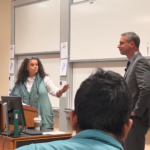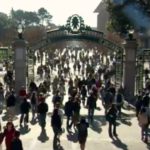Let’s Be a Little More Careful, Please
Editor’s Note: This blog originally appeared at Academe Blog, the blog of the American Association of University Professors (AAUP).
A decade or more ago, at a faculty party in New York City, I listened in as a diverse group of faculty spoke casually and disparagingly of “hillbillies,” “rednecks” and “white trash.” I reminded them that they were speaking of my own people (my ancestry is completely Appalachian), though they shouldn’t really be demeaning any group, no matter who might be around. I was met by fisheyed responses, including the comment, “Well, you left there.”
My experience is not unusual. Author Anne Shelby, in an essay “The ‘R’ Word” for Confronting Appalachian Stereotypes (Dwight Billings, et al, eds.), writes:
If you happen to be from eastern Kentucky, as I am, then other people’s stereotypes of the place you are from are as much a part of your landscape as the hills themselves. They can loom as large and seem as permanent. You have to find your way over or around them. But unlike the mountains, which can be seen from some distance, stereotypes jump out at you in ambush—at parties and meetings, at dinner with friends, from movies, from magazines and newspapers, from your favorite TV show. Even in college classes.
I am reminded of this by the report in Yale News about Yale University’s Pierson College Dean June Chu. Apparently, she “published controversial reviews of local businesses on her personal Yelp account, on one occasion referring to clientele of a restaurant as ‘white trash’ and ‘low class folks,’” According to The Washington Post, Chu has since apologized: “My remarks were wrong. There are no two ways about it. Not only were they insensitive in matters related to class and race; they demean the values to which I hold myself and which I offer as a member of this community.”
Personally, I am skeptical that she means it—not that I have ever met Chu or know anything about her. My skepticism comes from what I have seen on university campuses since returning to academia less than two decades ago. Nothing I have said in defense of the Scots-Irish based mountain culture of my own ancestry has met much more than shrugs; there is a general lack of sympathy for even the poorest folk of the hollers.
Few of my colleagues expressed any interest when I tailored an introductory literature class around that of Appalachia. Only the rare person understood what I was talking about and then only because they, too, had backgrounds in white American cultures that had become fair game for disparagement in many urban or academic American settings.
For the most part, academics, at least, feel that “white” culture has had such an advantage for so long that it can take care of itself while attention is turned to the neglected others. While there is a point here, it is also true that the vast majority of white Americans have participated only peripherally (if at all) in the culture universities have long centered upon. Their concerns, their arts and their passions have rarely made it into academic settings at all—and have often been, in the few cases where they have been considered, seen simply as kitsch. Shut out in the first place, they feel doubly excluded by an “inclusiveness” that pointedly looks to bring in others, not them.
As a result, few of us in academia can understand the outrage that the phrase “white privilege” evokes in many areas of white America. However perceptive Peggy McIntosh’s list of 50 points of skin-color advantage may be, there are millions of white Americans who have never experienced what they consider “privilege” at all. They see all advantage going to others (including, of course, other whites). In this sense, the phrase “white privilege” is an unfortunate coinage: the initial reaction of those whites whose lives have been hardscrabble is to reject it out of hand instead of listening to the argument it supports.
Those of us who have lived in the mountains (or in much of the rest of white America, if you want to know the truth) know that there are certain whites who, if they walk into a store, a bank or a school, are treated completely differently than are other white people. In Faulkner’s Yoknapatawpha County, these would be the Snopeses. In California in 1937, they would have been the Okies. In Detroit in the 1950s, they were the auto workers who escaped back to West Virginia or Kentucky whenever possible. It is easy to disparage these people as uncouth, ill-spoken and tasteless from the “heights” of academia, as Chu has done in New Haven (and as Richard Hofstadter does in Anti-Intellectualism in American Life, for that matter), especially if one assumes they have privilege they have never mastered. The fault of their condition must be theirs, not their ethnicity’s, so they can be lambasted without concern. The unspoken assumption is that they haven’t taken advantage of the possibilities inherent in their skin color, so their failures are theirs alone. That is what makes them fair game for the type of derision Chu put forward on Yelp.
We in academia bend over backwards to avoid even the appearance of ethnic, racial or even religious condescension—except when it comes to poor whites. Their situation is their own fault; they can be sneered at without repercussion. They have failed on their own, after all, and have failed even though they have had all the “advantages” of privilege.
The reality is much more complicated. We should no more brush off these people (my relatives) as trash than we should any other people, anywhere.




